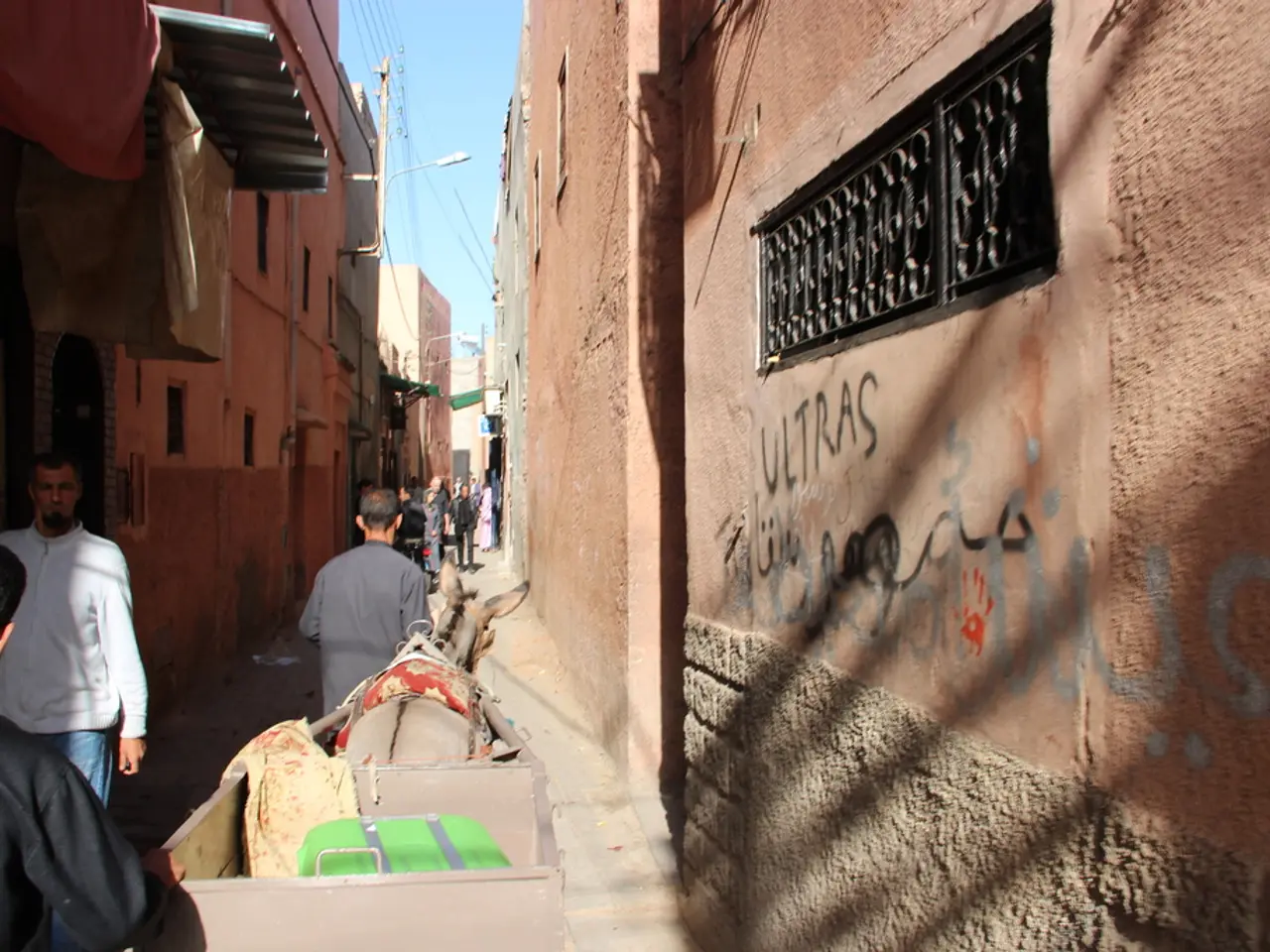The escalating food scarcity among Gazans has been labeled a 'moral dilemma', sparking debate, despite ongoing conflict between Israel and Palestine leading to accusations of genocide.
In recent times, there has been a noticeable shift in the stance of prominent politicians towards Israel's treatment of Palestinians in Gaza. This change in position has been influenced by several key factors.
Declining Public Support
The erosion of support for Israel’s military actions in Gaza, particularly among Democrats and younger Americans, has put pressure on political representatives to voice more critical views. For instance, approval for Israel’s actions among Democrats has dropped significantly, from 36% at the conflict’s start to just 8% currently[1][2].
Humanitarian Concerns
The widespread suffering of Gaza's civilian population, including starvation and other humanitarian crises, has led to the acknowledgement of a "moral crisis". This recognition has conditioned political discourse and sparked calls for reassessing continued military support[1][3].
Political Context in Israel
The existence of a right-wing Israeli government has contributed to international unease and criticism. This shift in political stance intensifies concerns about Israel's military and political stance towards Palestinians, motivating some politicians to reconsider their support[3].
Political Polarization in the U.S.
The divide between Republican and Democratic views on Israel's actions in Gaza is stark. While Republican support remains stable or has even increased (71%), Democratic disapproval is on the rise[1][2]. This polarization suggests that changes in stance are partly driven by domestic partisan dynamics.
Regional Diplomatic Efforts
Regional diplomatic initiatives, such as the Abraham Accords, promote a two-state solution and a more nuanced approach to Gaza’s future. These efforts encourage politicians to consider diplomatic alternatives to purely military solutions[3].
Recent Developments
The New York Times editorial board has called for the Israeli government to allow food deliveries and work towards a ceasefire. The Israeli Defense Forces have faced accusations of cruelty and depravity, with Amnesty International's deputy Middle East and North African director, Hussein Baoumi, criticizing Ursula von der Leyen's statement as too little, too late in the face of genocide and engineered starvation in Gaza[4].
In addition, a number of prominent figures who previously supported Israel's actions in Gaza have had a public change of heart in recent days. The French, Canadian, and European governments have announced plans to recognize a Palestinian state, while the International Criminal Court has made special mention of Israel's use of starvation as a weapon of war[5].
Ursula von der Leyen, the President of the European Commission, has stated that the images from Gaza are unbearable and that civilians in Gaza have suffered too much for too long, urging for an immediate end to the conflict[6]. Meanwhile, the Israeli government continues to allow weapons to travel from Europe and America to Israel and onward to Gaza[7].
In the UK, Keir Starmer has faced criticism for his previous defence of Israel's right to cut off water and electricity supplies to Gaza. However, his government has recently designated the group Palestine Action a terrorist organization, despite its non-violent actions[8].
In conclusion, the combination of these factors has led prominent politicians to change their stance, openly recognizing the moral crisis faced by Gaza’s population[1][2][3]. However, the Israeli government continues to carry out a campaign of genocidal slaughter in Gaza, with weapons still traveling from Europe and America to Israel and onward to Gaza[7]. This raises questions about the effectiveness of international condemnation and the need for more decisive action to bring an end to this ongoing crisis.
[1] Pew Research Center. (2021). U.S. Public Opinion on Israel and the Palestinians: Shifts in Partisan Views. [online] Available at: https://www.pewresearch.org/global/2021/05/18/u-s-public-opinion-on-israel-and-the-palestinians-shifts-in-partisan-views/
[2] YouGov. (2021). U.S. Public Opinion on Israel and the Palestinians. [online] Available at: https://yougov.co.uk/topics/world/articles-reports/2021/05/18/american-public-opinion-israel-palestine
[3] The Guardian. (2021). Israel-Palestine: what's behind the shift in US politics? [online] Available at: https://www.theguardian.com/world/2021/may/24/israel-palestine-whats-behind-the-shift-in-us-politics
[4] The New York Times. (2021). Editorial Board. It's Time for Israel to End the Siege of Gaza. [online] Available at: https://www.nytimes.com/2021/05/19/opinion/israel-gaza-ceasefire.html
[5] The Guardian. (2021). Israel's war crimes in Gaza: the evidence is clear, say human rights groups. [online] Available at: https://www.theguardian.com/world/2021/may/20/israels-war-crimes-in-gaza-the-evidence-is-clear-say-human-rights-groups
[6] European Commission. (2021). Ursula von der Leyen: I am deeply concerned about the situation in Gaza. [online] Available at: https://ec.europa.eu/commission/commissioners/document/ursula-von-der-leyen_en
[7] Middle East Monitor. (2021). Israel continues to receive arms from Europe and US. [online] Available at: https://www.middleeastmonitor.com/20210522-israel-continues-to-receive-arms-from-europe-and-us/
[8] The Guardian. (2021). Keir Starmer's government designates Palestine Action a terrorist organisation. [online] Available at: https://www.theguardian.com/politics/2021/may/18/keir-starmer-government-designates-palestine-action-a-terrorist-organisation
- The declining public support for Israel's military actions in Gaza, particularly among Democrats and younger Americans, has led to an increased scrutiny of politicians' positions on war-and-conflicts, specifically Israel's treatment of Palestinians.
- The widespread humanitarian crises in Gaza, such as starvation, have prompted a reassessment of politics, with politicians acknowledging a "moral crisis" and calling for a reevaluation of continued military support.






